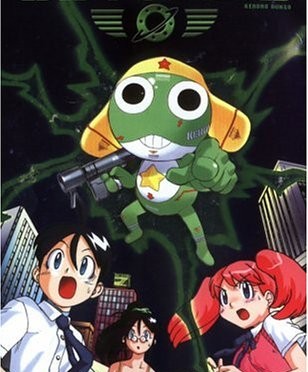I get bored at the salon a lot, so I’ve taken to bringing my own literature. Last week it was Sgt Frog volume 1.
Keroro, the frog sergeant in question, is an alien who comes to Earth as a scout in readiness for the invasion of the Earth. By chance he ends up in the Hinata family house where he is quickly captured. When a hilarious misunderstanding leaves him and his platoon stranded on Earth, Keroro is left to fend for himself as he best knows how…which means slaving for the Hinata household as their unpaid housekeeper!
Sounds like a sad tale, but it’s actually quite hilarious, mostly due to Keroro’s charm and upbeat attitude. Far from a shrinking violet he’s a tough-talking, mischievously insubordinate, choleric and has a crazy love for building Gundam models. Part of the humor comes from the disjointed fact that he’s an alien frog and yet loves modern things like iMacs and manga.
The human component is the Hinata family: Natsumi the bossy older sis, Fuyuki the easygoing little brother and their mother Aki. Personally I’m always more interested in the activities of the frog team, but the humans provide a good foil for their personalities to bounce off. It wouldn’t be the same manga without them.
Volume 1 starts Keroro’s abandonment on Earth. He later finds his subordinate Tamama (soooo cuuuuuuuute) who is living with Fuyuki’s classmate Momoka. The end of the volume introduces Moa, a.k.a. Angol Mois, the Lord of Destruction… currently disguised as a 14 year old girl who called Keroro “Uncle”. I can’t wait for volume 2!




